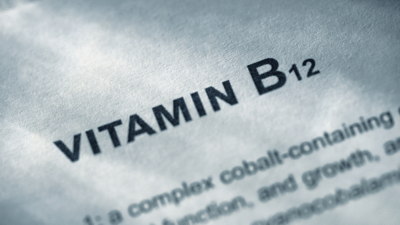
Vitamin B12, or cobalamin, is an energy-dense nutrient with an array of functions, including the development of red blood cells, nerve function, and the synthesis of DNA. It is impossible for the human body to synthesize it, thus requiring it from an external source, such as meat, fish, eggs, and dairy, or as an alternative supplement. Mostly, it starts showing slight symptoms in the initial stage, yet in the later stages, complications may advance into serious health issues if not addressed on time. Below are five signs that will help you provide hints to an individual's vitamin B12 deficiency.
Frequently Dealing with Fatigue and Weakness
One of the very common signs of B12 deficiency, described more often than any other, is the feeling of fatigue and weakness. Even after proper rest, one would feel restless, and unusual fatigue is experienced by a person with low Vitamin B12. This is also explained by the inability of a person to technically produce healthy red blood cells in sufficient numbers to allow oxygen to be carried efficiently. In order to maximize energy levels, people are opting for supplements such as vitamin B12 formulated to enhance stamina and further healthy energy metabolism.
Experiencing Tingling and Numbness
The second symptom experienced is numbness or tingling, and this happens in the feet and hands. Vitamin B12 functions in the maintenance of the protective sheath of nerves. Without it, the nerves start to fail, and a "pins and needles" phenomenon ensues, which can lead to disorders of balance or coordination if the deficiency is left untreated. Regular supplementation can help maintain nerve health and is crafted to support both nerve function and red blood cell production
Developing Mood Changes and Memory Problems
Intellectual and mental capacities all depend on B12 levels too, because this vitamin regulates the synthesis of mood chemicals, which include serotonin and dopamine. If B12 levels are low, irritability can set in, anxiety can pursue depression, or even forgetfulness can occur in some circumstances. An appropriate, balanced diet should always be followed. However, in cases where such food sources are just not enough, a balanced supplement can come in handy to fill the gap.
Pale or Yellow-Toned Skin
Skin color changes also serve as a symptom of B12 deficiency. People who lack B12 typically find that their skin is not as normal in color or, at times, is yellowish in color. The reason for this is that low B12 prevents red blood cells from being produced, and as the cells are being destroyed, the release of bilirubin gives the skin and eyes a yellowish color. Additionally, supplementation with multivitamins helps to fulfill the body’s requirements
Sore or inflamed tongue
The tongue is likely to show the status of nutrients. Occasionally, a red, raw, and inflamed tongue indicates "glossitis," which may look smooth and be tender or give a burning sensation. Some individuals also face oral ulcers, which can be painful, so speaking or swallowing becomes hard.
All the above-stated reasons are general signs of Vitamin B12 deficiency that can be detected through a basic blood test. Instead of self-diagnosis, reach out to a medical expert to understand what is causing it at its core and try to treat it accordingly. After one receives proper treatment, diet, and supplements when needed, one can keep their B12 balanced, along with their well-being.
(Attributed to Sandeep Gupta, Nutraceutical Man of India , Strategic Director, Founder Mentor, INLIFE Healthcare)
 Vitamin B12, or cobalamin, is an energy-dense nutrient with an array of functions, including the development of red blood cells, nerve function, and the synthesis of DNA. It is impossible for the human body to synthesize it, thus requiring it from an external source, such as meat, fish, eggs, and dairy, or as an alternative supplement. Mostly, it starts showing slight symptoms in the initial stage, yet in the later stages, complications may advance into serious health issues if not addressed on time. Below are five signs that will help you provide hints to an individual's vitamin B12 deficiency.
Vitamin B12, or cobalamin, is an energy-dense nutrient with an array of functions, including the development of red blood cells, nerve function, and the synthesis of DNA. It is impossible for the human body to synthesize it, thus requiring it from an external source, such as meat, fish, eggs, and dairy, or as an alternative supplement. Mostly, it starts showing slight symptoms in the initial stage, yet in the later stages, complications may advance into serious health issues if not addressed on time. Below are five signs that will help you provide hints to an individual's vitamin B12 deficiency.